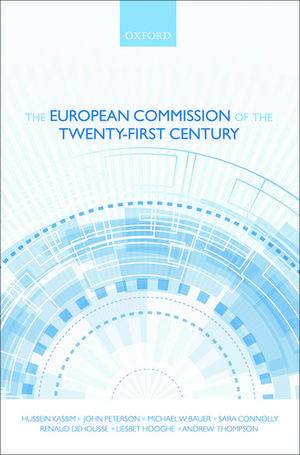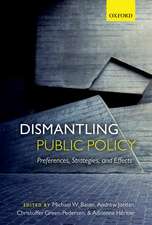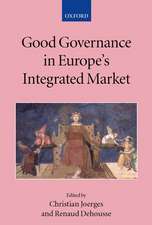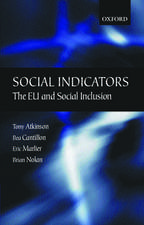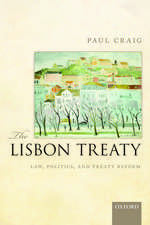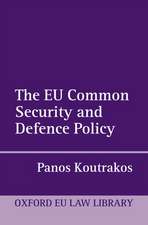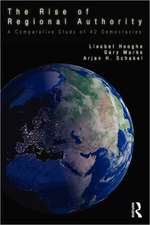The European Commission of the Twenty-First Century
Autor Hussein Kassim, John Peterson, Michael W. Bauer, Sara Connolly, Renaud Dehousse, Liesbet Hooghe, Andrew Thompsonen Limba Engleză Hardback – 26 iun 2013
Preț: 631.73 lei
Preț vechi: 903.35 lei
-30% Nou
Puncte Express: 948
Preț estimativ în valută:
120.88€ • 126.47$ • 100.42£
120.88€ • 126.47$ • 100.42£
Carte tipărită la comandă
Livrare economică 22-28 martie
Preluare comenzi: 021 569.72.76
Specificații
ISBN-13: 9780199599523
ISBN-10: 0199599521
Pagini: 400
Dimensiuni: 162 x 235 x 29 mm
Greutate: 0.75 kg
Ediția:New.
Editura: Oxford University Press
Colecția OUP Oxford
Locul publicării:Oxford, United Kingdom
ISBN-10: 0199599521
Pagini: 400
Dimensiuni: 162 x 235 x 29 mm
Greutate: 0.75 kg
Ediția:New.
Editura: Oxford University Press
Colecția OUP Oxford
Locul publicării:Oxford, United Kingdom
Recenzii
This large volume -- an impressive joint research effort -- combines many insights into politicoadministrative theory with a broad-based questionnaire to a targeted sample of some 4000 out of some 12,00014,000 officials.
The European Commission has often been misrepresented by pundits, politicians, and scholars. This rigorous, dispassionate, and thorough new work finally gives us the accurate, comparative, and complex picture that we have long needed. We learn about who works in the Commission, what they do, how they work together, and how the Commission has changed in response to recent organizational reforms and in the world around it. This is a new starting point for those who need to know about the institutions of the European Union.
The European Commission of the Twenty-First Century is the most comprehensive and sophisticated examination of the Commission available in the literature. This book makes a major advance in the study of the European Union and its governance capacity. Even scholars and practitioners who believe they know the Commission will gain important insights from this volume.
The European Commission in Question team has had unparalleled access to administrative officials. They have used the survey and interview material exceptionally skilfully and effectively to produce an impressive account of the Commission. They sometimes challenge, sometimes support, sometimes qualify received wisdom about how the Commission works. They also make huge fresh advances in explaining the behaviour of its officials. The book is a landmark in developing our understanding of how policy-making bureaucracies work and how such bureaucracies should be studied.
Based on the information gathered from a survey and interviews with more than 2000 Commission officials, this book offers a detailed and stimulating portrait of a unique institution that represents a clear innovation in Europe's political organization.
added substantially to our knowledge about the only supranational executive in the world.
The European Commission has often been misrepresented by pundits, politicians, and scholars. This rigorous, dispassionate, and thorough new work finally gives us the accurate, comparative, and complex picture that we have long needed. We learn about who works in the Commission, what they do, how they work together, and how the Commission has changed in response to recent organizational reforms and in the world around it. This is a new starting point for those who need to know about the institutions of the European Union.
The European Commission of the Twenty-First Century is the most comprehensive and sophisticated examination of the Commission available in the literature. This book makes a major advance in the study of the European Union and its governance capacity. Even scholars and practitioners who believe they know the Commission will gain important insights from this volume.
The European Commission in Question team has had unparalleled access to administrative officials. They have used the survey and interview material exceptionally skilfully and effectively to produce an impressive account of the Commission. They sometimes challenge, sometimes support, sometimes qualify received wisdom about how the Commission works. They also make huge fresh advances in explaining the behaviour of its officials. The book is a landmark in developing our understanding of how policy-making bureaucracies work and how such bureaucracies should be studied.
Based on the information gathered from a survey and interviews with more than 2000 Commission officials, this book offers a detailed and stimulating portrait of a unique institution that represents a clear innovation in Europe's political organization.
added substantially to our knowledge about the only supranational executive in the world.
Notă biografică
Hussein Kassim taught previously at Birkbeck, University of London, the University of Nottingham and the University of Oxford. He has held visiting positions at Arena, University of Oslo, Columbia University, New York University, the Minda de Gunzburg Center for European Studies at Harvard University, and the Institut d'Etudes Politiques (Sciences Po) in Paris. He has published widely on the EU institutions, the relationship between the EU and the member states, especially France and the UK, and EU policy and administration. He is Professor of Politics in the School of Political, Social and International Studies and Co-investigator at the ESRC Centre for Competition Policy at the University of East Anglia.John Peterson previously held posts teaching international, European and American politics at the Universities of Glasgow, York, Essex, Oxford, and the University of California (Santa Barbara). He has also held visiting posts at the Universities of Vienna, California (Berkeley), Sciences Po Paris, University College Dublin, the Centre for European Policy Studies (Brussels), and the College of Europe (Bruges). He was Head of Politics/IR from 2007-10. John was a Visiting Scholar at the Institute of Governmental Studies at UC Berkley and the Social Science Research Centure (WZB) in Berlin during 2010-11. He has published widely on international politics, European integration, and public policy. He is Professor of International Politics in the School of Social and Political Science at the University of Edinburgh.Michael W. Bauer taught previously at the University of Konstanz From 1990-1996. He studied Social Sciences, German Philology and History in Mannheim, Frankfurt am Main and Vienna. He graduated 1996 with a Diploma in Social Sciences at the Humboldt-University Berlin. He was a Robert-Schuman-Fellow of the European Parliament in 1995. He holds a Masters in European Studies in Politics and Administration of the College of Europe, Bruges (1996/1997) and a PhD from the European University Institute, Florence (1997/2000). He worked for two years as an expert on the EU constitutional process for the Hessian Government (Hessische Staatskanzlei). His research interests like in comparative public policy and administration, EU institutions and politics, and the German Länder on which subjects he has published widely. He is Professor for Politics and Administration at the Institute of Social Sciences, Humboldt University of Berlin.Sara Connolly previously taught in the School of Economics at the University of East Anglia, Brunel University and the University of Oxford. She has held visiting positions at the Centre for Equality, Social Organisation and Performance at the University of Oslo and the Centre for European Studies at New York University. She has published widely on gender, pay and employment, media economics and public policy. She is Reader in Personnel Economics at the Norwich Business School and Director of the Diversity and Equality in Careers and Employment Research Centre at the University of East Anglia. Renaud Dehousse, prior to joining Sciences Po in 1999, was a Professor at the University of Pisa and at the European University Institute in Florence, where he led the Academy of European Law. He has been a visiting Professor at the University of Florence (Cesare Alfieri, the University of Lausanne, as well as Michigan University Law School, and at the College of Europe in Bruges). At Sciences Po, he co-directs the Master's in European Affairs and the 'Euro/Transatlantic Masters programme in partnership with the Universities of Bath, Madrid (Carlos III), Berlin (Freie Universität and Humboldt), Prague (Charles), Siena, Washington (Seattle) and North Carolina (Chapel Hill). He is a Professor at Sciences Po where he holds a Jean Monnet Chair in European Union Law and Political Science and directs the Centre d'études européennes.Liesbet Hooghe received her Ph.D from the University of Leuven in Belgium in 1989. Before joining UNC in 2000, she taught at the University of Toronto (1994-2000), and held research fellowships at Cornell University, Oxford University (Nuffield), and the European University Institute (Florence, Italy). Since 2004, she has been affiliated to the Free University of Amsterdam. Her principal areas of interest are comparative politics (Europe and the European Union), identity, political parties, and political elites. Over the past years she has also researched ethnic conflict, nationalism and federalism. She is Professor of Political Science at UNC-Chapel Hill. Andrew Thompson taught previously at the University of Wales, Cardiff, where he was Lecturer in Quantitative Methods at Cardiff Business School (1985-1996) and held research posts in the Greater London Association of Community Health Councils (1984-85), the University of Manchester (1979-1984), UMIST (1979) and Stockport Social Services Division (1978-79). His main research interests are in the field of citizenship and public policy, particularly in relation to health services. He is Professor of Public Policy and Citizenship; Postgraduate Adviser in the School of Social and Political Science, University of Edinburgh.
